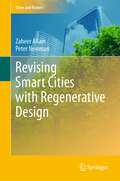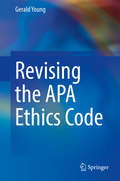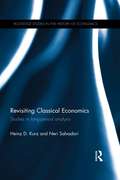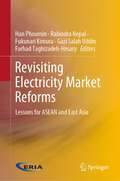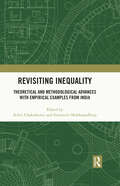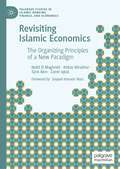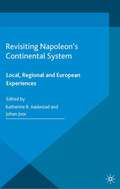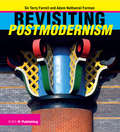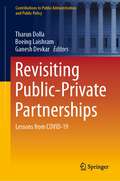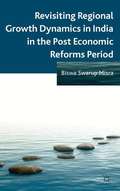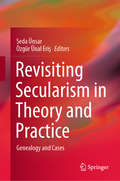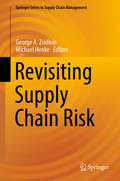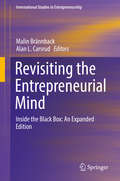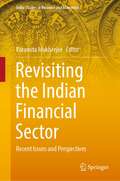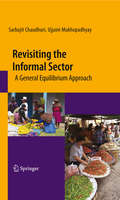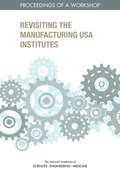- Table View
- List View
Review of the U.S. Department of Energy's Heavy Vehicle Technologies Program
by National Research CouncilThe National Academies Press (NAP)--publisher for the National Academies--publishes more than 200 books a year offering the most authoritative views, definitive information, and groundbreaking recommendations on a wide range of topics in science, engineering, and health. Our books are unique in that they are authored by the nation's leading experts in every scientific field.
Reviews of Environmental Contamination and Toxicology Volume 240 (Reviews of Environmental Contamination and Toxicology #240)
by Pim De VoogtReviews of Environmental Contamination and Toxicology attempts to provide concise, critical reviews of timely advances, philosophy and significant areas of accomplished or needed endeavor in the total field of xenobiotics, in any segment of the environment, as well as toxicological implications.
Revised Form 990
by Jody Blazek Amanda AdamsA line-by-line preparation guide to the completely new and revised Form 990 for nonprofit organizationsThe accurate and complete preparation of Form 990-the information return that must be filed annually by most types of tax-exempt organizations-is a key factor in maintaining public image and fundraising capabilities. The newly redesigned Form 990 was released in December 2008 with significant revisions to the initial June 2007 draft. Preparation of the new return will require tax-exempt organizations to gather extensive new information about their activities for disclosure on the new form beginning with their 2008 tax year.In Revised Form 990: A Line-by-Line Preparation Guide, authors Jody Blazek-who with other AICPA Task Force members was instrumental in effecting changes to the original IRS draft of the form-and Amanda Adams, provide step-by-step and line-by-line analysis and preparation guidelines for nonprofit professionals and nonprofessionals alike charged with preparing and submitting the form.This hands-on workbook walks you through the process of producing an annual report to the IRS that demonstrates continued qualification for exempt status for a nonprofit organization, explaining the information requested page by page and part by part. It addresses the issues and challenges for each part, particularly the new schedules. As each part is explained, the authors suggest when certain answers have negative consequences. Guidance is provided for functional expense reporting and generally accepted accounting principles for reporting revenues. A good discussion of the differences between book and tax reporting and records needed to accurately display financials for tax purposes is included. The Form 990-PF and Form 990-T are also examined.
Revised System for the Classification of Exchange Rate Arrangements
by Karl Habermeier Annamaria Kokenyne Romain Veyrune Harald AndersonA report from the International Monetary Fund.
Revising Leadership Thinking: Requirements of the Knowledge Workplace
by Michael MaccobyThe kind of leadership needed for past eras doesn't fit the age of knowledge work. Knowledge workers want to collaborate with a leader who makes their lives more meaningful, and that calls for more than stellar personal qualities. The conventional leadership literature that has formed our thinking neglects the motivation of followers. In the new context, underlying assumptions about followers no longer hold true, and leadership theory must be driven by understanding and engaging different kinds of personalities.
Revising Smart Cities with Regenerative Design (Cities and Nature)
by Peter Newman Zaheer AllamThis book presents a road map to urban regeneration through the contemporary concept of smart cities. It investigates why the concept has gained adoption as it has but until now it has been geared towards a profit-making venture by large corporations and ignoring the economic aspirations of smaller companies and city councils. The technologies can provide enhanced liveability levels if the concept is redefined. This work will be of interest to academics and policy makers looking at exploring how to drive urban regeneration in a sustainable and inclusive fashion while supporting local economies. It presents a case study of Port Louis, Mauritius, with unique insights and data. Academics, policy makers and urban developers could potentially adopt the model and calibrate it to various cities and quantify the economic and social benefits.
Revising the APA Ethics Code
by Gerald YoungThis integrative volume proposes major revisions to the APA ethics code and works toward creating an ethics code applicable across psychology, psychiatry, and related mental health professions. Careful analysis identifies theoretical and structural deficits in the principles and standards comprising the existing APA code, corrects its ambiguities, and provides scientific and compare-contrast illustrations to address current and potential controversies arising from current gray areas. Proposed revisions are informed by the American Medical Association, Canadian Psychological Association, and international ethics codes, emphasizing not only clearer language and diverse situations but also deeper conceptualizations of professional skills such as decision-making and client engagement. Ideally, the resulting universal code would be more inclusive of evolving ethical challenges in increasingly complex work environments and society. Included in the coverage: Comparison of the APA and CPA ethics codes. Proposing five core and five supplementary ethical principles and their sub-principles. Analyzing the APA's ethical standards toward revising the APA ethics code. Elucidating new standards, domains, sub-domains, and meta-principles. Culling lessons from the 2017 AMA medical ethics code. Examining ethical decision-making: fallacies/biases and models. Proposing new concepts, such as participatory ethics and psychological co-regulation. Giving concrete and practical recommendations toward revising the APA ethics code and creating a universal mental health ethics code. An exhaustive text that spans clinical, research, teaching, and education domains, Revising the APA Ethics Code is essential reading for ethics scholars, practitioners, and the APA administrative and ethics committee hierarchies. These real-world guidelines will help ensure that the mental health professions remain both modern and moral.
Revisiting Austria: Tourism, Space, and National Identity, 1945 to the Present (Austrian and Habsburg Studies #28)
by Gundolf GramlFollowing the transformations and conflicts of the first half of the twentieth century, Austria’s emergence as an independent democracy heralded a new era of stability and prosperity for the nation. Among the new developments was mass tourism to the nation’s cities, spa towns, and wilderness areas, a phenomenon that would prove immensely influential on the development of a postwar identity. Revisiting Austria incorporates films, marketing materials, literature, and first-person accounts to explore the ways in which tourism has shaped both international and domestic perceptions of Austrian identity even as it has failed to confront the nation’s often violent and troubled history.
Revisiting Classical Economics: Studies in Long-Period Analysis (Routledge Studies in the History of Economics)
by Heinz D. Kurz Neri SalvadoriThe financial crisis and the economic crisis that followed triggered a crisis in the subject of economics, as it is typically being taught today especially in macroeconomics and related fields. A renewed interest in earlier authors, especially the classical economists from Adam Smith to David Ricardo and John Maynard Keynes, developed. This book may also be seen as a response to this interest. What can we learn from the authors mentioned, what we could not learn from the mainstream? This volume contains a selection of essays which deepens and widens the understanding of the classical approach to important problems, such as value and distribution, growth and technical progress, and exhaustible natural resources. It is the fourth collection in a row and reflects an on-going discussion of the fecundity of the classical approach. A main topic of the essays is a comparison between the classical approaches with modern theory and thus an identification of what can be learned by elaborating on the ideas of Smith and Ricardo and Marx above and beyond and variously in contradiction to certain mainstream view. Since the work of Piero Sraffa spurred the revival of classical economic thought, his contributions are dealt with in some detail. The attention then focuses on economic growth and the treatment of exhaustible resources within a classical framework of the analysis.
Revisiting Electricity Market Reforms: Lessons for ASEAN and East Asia
by Farhad Taghizadeh-Hesary Fukunari Kimura Han Phoumin Rabindra Nepal Gazi Salah UddinThis book combines the fundamentals of industrial organization theories based on microeconomic foundations, applied econometrics and environmental and natural resource economics in undertaking a comprehensive review of reforms of the power sector and its impact on industrial and socio-economic performance. The book provides the reader with the intellectual groundwork necessary for understanding the workings and interactions of today’s reforming power markets such as in the ASEAN and East Asia that are striving to achieve the energy policy trilemma of affordability, energy sustainability and energy security. The topics addressed in this book include application of welfare theorems such as competition in and for the market in the electricity sector, market failures such as lack of electricity access, analysis of forecasting models under volatility, energy resource allocation such as renewable energy and competitive market designs of energy markets. Country-specific and region-specific case studies are used to analyze the progress and outcomes of market-driven electricity reforms across the reforming and advanced electricity markets. Therefore, the book derives policy lessons and provides policy recommendations in reforming power markets for the ASEAN and East Asia taking stock of more than three decades of global experience with power sector reforms. The electricity markets case studies are carefully chosen and supported by extensive data analyses as appropriate. This book on energy economics and policy is highly recommended to readers who seek an in-depth and up-to-date integrated overview about the evolving literature and status on electricity market reforms with a particular reference to Asia.
Revisiting Inequality: Theoretical and Methodological Advances with Empirical Examples from India
by Achin Chakraborty Simantini MukhopadhyayThis volume discusses the current state of knowledge on the conceptual understanding of inequality. The book poses a range of empirical puzzles in the Indian context and examines inequalities across categories of the region of residence, caste, and sex, using a fascinating range of outcome indicators, comprising education, health, earnings, self-employment, and crime.The empirical chapters of this volume use various large-scale secondary data sources to expose the deep-rooted, structural inequalities in the Indian society. It answers some of the pertinent questions around inequality such as why do the backward regions of India continue to remain backward, both in terms of economic and human development indicators? Why do enterprises owned by backward caste individuals have systematically lower business earnings? Are backward castes and women more likely to face crime when their relative status improves? How do the circumstances that children find given at birth influence their learning outcomes? etc.The book will be of interest to teachers, students, and researchers of economics of education, development studies, development economics, and Indian economics. It will also be useful for policymakers, academicians, and anyone curious to learn about inequality.
Revisiting Islamic Economics: The Organizing Principles of a New Paradigm (Palgrave Studies in Islamic Banking, Finance, and Economics)
by Abbas Mirakhor Zamir Iqbal Nabil El Maghrebi Tarık AkınThis book discusses the need for a paradigm shift from Islamic economics universe of discourse to Iqtisād, a socio-economic system that is entirely independent from other economic doctrines and systems of thought. It provides an overview of critiques of the science and dogma of mainstream, orthodox, neoclassical, or simply Economics, with its axioms of rationality, scarcity, and unlimited wants. There is also a critical analysis of Islamic economics, and its failures to set its own policy agenda and development objectives. Our contention in this book is that Iqtisād--the Qur’an’s vision of how the economy is to be arranged—provides such a paradigm with a radically different philosophical foundation from that of Economics to the point that makes grafting one onto the other Impossible. Iqtisād offers a genuine and authentic Islamic paradigm with unique etymological and philosophical foundations. It is a unique system that derives its organizing principles from the principal source of the Quran, rather than Economics. The logical coherence of its immutable system of rules compliance, institutional structures, and risk-sharing relations provides the foundations for economic dynamism, financial stability, and shared prosperity. It ensures that resources are efficiently managed, poverty is eradicated, income and wealth mal-distributions are corrected, and the internal sources of economic injustices gripping human societies are eliminated. The Impossibility Theorem proposed in this book implies that, metaphysically, ontologically, epistemologically, axiologically, and teleologically, the two polar cases of Iqtisād and Economics are so radically different to rule out any grafting of one onto the other in order to present an intermediate paradigm with a synthetic discipline called Islamic economics. Given its multidisciplinary contents, this book will be of interest to a wide audience, including economists, policymakers, philosophers, theologians, and jurists, and can guide also free-thinking readers to a clarity of understanding about the conditions of humanity and the imperative of change with a sincerity of purpose and coherence in knowledge.
Revisiting Napoleon’s Continental System: Local, Regional and European Experiences (War, Culture and Society, 1750-1850)
by K. Aaslestad J. JoorEconomic warfare during the Napoleonic era transformed international commerce; redirecting trade and generating illicit commerce. This volume re-evaluates the Continental System through urban and regional case studies that analyze the power triangle of the French, British and neutral powers and their strategies to adapt to trade restrictions.
Revisiting Postmodernism
by Terry Farrell Adam Nathaniel FurmanRevisiting Postmodernism offers an engaging, wide-ranging and highly illustrated account of postmodernism in architecture from its roots in the 1940s to its ongoing relevance today. This book invites readers to see Postmodernism in a new light: not just a style but a cultural phenomenon that embraces all areas of life and thrives on complexity and pluralism, in contrast to the strait-laced, single-style, top-down inclination of its predecessor, Modernism. While focusing on architecture, this book also explores aspects such as urban masterplanning, furniture design, art and literature. Looking at Postmodernism through the lens of examples from around the world, each chapter explores the movement in the UK on the one hand, and its international counterparts on the other, reflecting on the historical movement but also how postmodernism influences practices today. This book offers the insider’s view on postmodernism by the author, a recognised pioneer in the field of postmodern architecture and a prestigious and authoritative participant in the postmodern movement.
Revisiting Public-Private Partnerships: Lessons from COVID-19 (Contributions to Public Administration and Public Policy)
by Boeing Laishram Tharun Dolla Ganesh DevkarThis edited volume discusses the resilience of public-private partnerships (PPPs) in the wake of the COVID-19 pandemic. Using a comparative lens, the book assesses the degree to which global PPP infrastructure projects have been affected by the pandemic and details short term and long-term measures undertaken by governments and private parties to mitigate disruption to infrastructure delivery. Secondly, it focuses on improving the state-of-art knowledge by suggesting future directions to be taken by governments, practitioners, and researchers in order to create resilience in infrastructure projects when using PPPs as the delivery model. Chapters present diverse case studies of PPP governance across countries, covering topics such as regulatory issues, risk management, financing, contractual governance, arbitration, and stakeholder management. Providing a systematic review, assessment, and research agenda on lessons learned from the pandemic, this volume will appeal to researchers and students of public administration, public economics, construction management, infrastructure management, and public management, as well as practitioners and government professionals.
Revisiting Regional Growth Dynamics in India in the Post Economic Reforms Period
by Biswa Swarup MisraThe post 2000 period for India has been quite eventful for Indian economy. The Book examines the implications of growth for inequality and some of the major drivers of growth like infrastructure, health and credit. The book discusses the key challenges as well the game changer initiatives that will shape India's growth in the medium term.
Revisiting Secularism in Theory and Practice: Genealogy and Cases
by Seda Ünsar Özgür Ünal ErişThis book offers a philosophical and macro-historical analysis of secularism, supported by an investigation of various contemporary cases. Starting with an in-depth theoretical discussion of the meaning of secularism, it subsequently presents a historical study on the secularization of norms and identities in Europe. The respective case studies cover topics such as the epistemologies of secularism, liberalization and embedded secularism, the relationship between modernity and secularism, the socio-anthropology of secularism, Turkish modernization as a cultural revolution, the political economy of secularism in Turkey, and the secular rationale of the EU neighborhood policy.
Revisiting Supply Chain Risk (Springer Series in Supply Chain Management #7)
by George A. Zsidisin Michael HenkeThis book offers a bridge between our current understanding of supply chain risk in practice and theory, and the monumental shifts caused by the emergence of the fourth industrial revolution. Supply chain risk and its management have experienced significant attention in scholarship and practice over the past twenty years. Our understanding of supply chain risk and its many facets, such as uncertainty and vulnerability, has expanded beyond utilizing approaches such as deploying inventory to buffer the initial effects of disruptions. Even with our increased knowledge of supply chain risk, being in the era of lean supply chain practices, digitally managed global supply chains, and closely interconnected networks, firms are exposed as ever to supply chain uncertainties that can damage, or even destroy, their ability to compete in the marketplace. The book acknowledges the criticality of big data analytics in Supply Chain Risk Management (SCRM) processes and provides appropriate tools and approaches for creating robust SCRM processes. Revisiting Supply Chain Risk presents a state-of-the-art look at SCRM through current research and philosophical thought. It is divided into six sections that highlight established themes, as well as provide new insights to developing areas of inquiry and contexts on the topic. Section 1 examines the first step in managing supply chain risk, risk assessment. The chapters in Section 2 encompass resiliency in supply chains, while Section 3 looks at relational and behavioral perspectives from varying units of analysis including consortiums, teams and decision makers. Section 4 focuses on examining supply chain risk in the contexts of sustainability and innovation. Section 5 provides insight on emerging typologies and taxonomies for classifying supply chain risk. The book concludes with Section 6, featuring illustrative case studies as real-world examples in assessing and managing supply chain risk.
Revisiting Targeting in Social Assistance: A New Look at Old Dilemmas (Human Development Perspectives)
by Margaret Grosh Emil Tesliuc Phillippe Leite Matthew Wai-PoiTargeting is a commonly used, but much debated, policy tool within global social assistance practice. Revisiting Targeting in Social Assistance: A New Look at Old Dilemmas examines the well-known dilemmas in light of the growing body of experience, new implementation capacities, and the potential to bring new data and data science to bear. The book begins by considering why or whether or how narrowly or broadly to target different parts of social assistance and updates the global empirics around the outcomes and costs of targeting. It illustrates the choices that must be made in moving from an abstract vision to implementable definitions and procedures, and in deciding how the choices should be informed by values, empirics, and context. The importance of delivery systems and processes to distributional outcomes are emphasized, and many facets with room for improvement are discussed. The book also explores the choices between targeting methods and how differences in purposes and contexts shape those. The know-how with respect to the data and inference used by the different household-specific targeting methods is summarized and comprehensively updated, including a focus on “big data†? and machine learning. A primer on measurement issues is included. Key findings include the following: - Targeting selected categories, families, or individuals plays a valuable role within the framework of universal social protection. - Measuring the accuracy and cost of targeting can be done in many ways, and judicious choices require a range of metrics. - Weighing the relatively low costs of targeting against the potential gains is important. - Implementing inclusive delivery systems is critical for reducing errors of exclusion and inclusion. - Selecting and customizing the appropriate targeting method depends on purpose and context; there is no method preferred in all circumstances. - Leveraging advances in technology--ICT, big data, artificial intelligence, machine learning--can improve targeting accuracy, but they are not a panacea; better data matters more than sophistication in inference. - Targeting social protection should be a dynamic process.
Revisiting the Department of Defense SBIR Fast Track Initiative
by National Research Council of the National AcademiesIn October 1995, the Department of Defense launched a Fast Track initiative to attract new firms and encourage commercialization of Small Business Innovation Research (SBIR) funded technologies throughout the department. The goal of the Fast Track initiative is to help close the funding gap that can occur between Phase I and II of the SBIR program. The Fast Track initiative seeks to address the gap by providing expedited review and essentially continuous funding from Phase I to Phase II, as long as applying firms can demonstrate that they have obtained third-party financing for their technology. Another program initiative, Phase II Enhancement, was launched in 1999 to concentrate SBIR funds on those R&D projects most likely to result in viable new products that the Department of Defense and others will buy. The current volume evaluates the two SBIR Program initiatives--Fast Track and Phase II Enhancement--and finds that both programs are effective. Ninety percent of Fast Track and 95 percent of Phase II Enhancement reported satisfaction with their decision. This book identifies the successes and remaining shortcomings of the programs, providing recommendations to address these issues.
Revisiting the Entrepreneurial Mind
by Alan L. Carsrud Malin BrännbackThe book explores various aspects of cognitive and motivational psychology as they impact entrepreneurial behavior. Building upon the 2009 volume, Understanding the Entrepreneurial Mind, the editors and contributors explore the cognitions, motivations, passions, intentions, perceptions, and emotions associated with entrepreneurial behaviors, in each case preserving their original chapters and enhancing them with thoughtful and targeted updates, reflecting on the most recent developments in theory and practice, telling the story of what has transpired in the last decade in the field of entrepreneurial psychology. The volume addresses such questions as: Why do some people start business and others do not? Is entrepreneurship a natural quality or can it be taught? Do entrepreneurs think differently from others? While there is a great deal of literature exploring the dynamics of new firm creation, policies to promote innovation and technology transfer, and the psychology of creativity; research on entrepreneurial mindset or cognition is relatively new, and draws largely from such related fields as organizational behavior, cognitive and social psychology, career development, and consumer research. In this book, editors Br#65533;nnback and Carsrud have reassembled the contributors to Understanding the Entrepreneurial Mind to discuss new research paradigms given their vantage point years after the original volume was published. Featuring the most current literature references, Revisiting the Entrepreneurial Mind continues to challenge conventional approaches to entrepreneurship and articulate an agenda for future research.
Revisiting the Indian Financial Sector: Recent Issues and Perspectives (India Studies in Business and Economics)
by Paramita MukherjeeThis book provides perspectives on the latest developments and pertinent issues in the Indian financial sector in current times. The reforms initiated in the nineties in the financial sector have transformed the way financial markets and institutions function today. However, certain sectors like banking, and markets like the capital market have undergone sea changes. The research contributions in this book focus on the issues pertaining to such sectors like banking, NBFCs and the stock market. The opening up of financial markets and emergence of institutional investors have been a significant phenomenon in the Indian context. At this backdrop of increasing financial integration, the impact of financial liberalisation on the overall development of the sector, and how the global policies and events influence the Indian financial sector, are analysed in the book. The emergence of new regulations in the capital markets to instill more discipline and transparency, have also changed the way corporates take financing decisions. For example, regulatory authorities are continuously reviewing norms pertaining to issues like promoters’ shareholding owing to risks arising from excessive leverage and the linkages between financial intermediaries. Corporate governance, environmental aspects are some important additions in corporate financing norms in the recent past. The book incorporates a discussion on this, too. Apart from these, the book also has incorporated several aspects on an emerging concept called financial inclusion, its measurement and constraints to achieve the same. And finally, at the backdrop of the disruption created by the COVID-19 pandemic, the impact on the Indian capital market is also discussed. Contributions are based on rigorous empirical research and incorporate the perspectives of renowned academicians in the field of finance and financial economics across the country. Apart from the research community, this book will also be helpful for financial analysts working in the financial sector to have some idea about the current issues, the direction of research on those issues and different perspectives on them.
Revisiting the Informal Sector
by Ujjaini Mukhopadhyay Sarbajit ChaudhuriThe last 50 years have seen unprecedented population growth and urbanization, particularly in developing countries. However, economic development in these countries has failed to generate adequate employment and income opportunities in the modern sector. This imbalance has compelled the surplus labor force to generate its own means of employment and survival in the informal sector. The informal sector is economic activity that is neither taxed nor monitored by a government. Its main characteristics are: easy entry for new enterprises, reliance on indigenous resources, family ownership of enterprises, small scale operations and low productivity, labor-intensive and adapted technology, reliance of workers on informal sources of education and skills, unregulated and competitive markets and lack of governmental support. This timely, comprehensive book provides insight into the diverse aspects of the informal sector, its role in the context of unemployment, child labor, globalization and environment, as well as its multi-faceted interaction with the other sectors of the economy. It outlines previous doctrines that portray the informal sector as a sector of last resort, and elucidates newer approaches that see the informal sector as dynamic and instrumental in ameliorating unemployment and propelling the developing economies towards growth and prosperity. Finally, the book critically reviews the contradictions within both to trace the nature and direction of desirable policy parameters. It is an invaluable reference for academics and students in development and international economics. The book's findings will also be useful to policymakers for application to development projects.
Revisiting the Manufacturing USA Institutes: Proceedings Of A Workshop
by Engineering Medicine National Academies of SciencesThe Manufacturing USA initiative seeks to reinforce U.S.-based advanced manufacturing through partnerships among industry, academia, and government. Started in 2012 and established with bipartisan support by the Revitalize American Manufacturing and Innovation Act of 2014, the initiative envisages a nationwide network of research centers for manufacturing innovation. Some 14 manufacturing innovation institutes have been established to facilitate the movement of early-stage research into proven capabilities ready for adoption by U.S. manufacturers. To better understand the role and experiences of the Manufacturing USA institutes, a committee of the National Academies of Sciences, Engineering, and Medicine convened a workshop on May 23, 2017 drawing together institute directors and manufacturing policy experts along with leaders from industry, academia, and government. Given the continued prominence of enhancing domestic manufacturing and international competitiveness in public policy discussions, the National Academies convened a second workshop on November 14, 2018, to monitor the progress of the Manufacturing USA institutes. This publication summarizes the presentations and discussions from this second workshop.
Revisiting the Meaning of Leadership
by Rakesh Khurana Joel M. Podolny Marya BesharovThe authors of this chapter contend that the study of leadership in organizational theory went awry when interest in leadership became too tightly coupled with organizational performance. Leading organizational theorists in the latter part of the twentieth century, such as Max Weber, Chester Barnard, and Philip Selznick, were not concerned with leadership because of its ability to explain financial performance. Instead, they were concerned with leadership's importance in infusing purpose and meaning into the lives of individuals. Although performance was not judged irrelevant by these earlier theorists, neither was it central. For them the primary significance of leadership rested in its importance in stemming the loss of meaning that they and other scholars of their time ascribed to modernity. The authors of this chapter conclude that if we are to judge the importance of leadership to organizational life, we need to break free from the strict interdependence of leadership success and organizational performance-and take a much broader view. This chapter was originally published as Chapter 3 of "Handbook of Leadership Theory and Practice: A Harvard Business School Centennial Colloquium."





